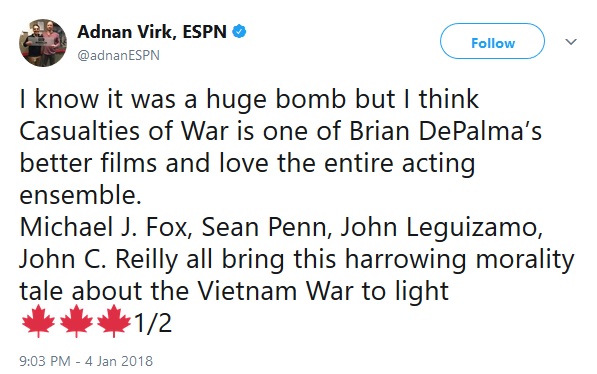

Updated: Saturday, January 6, 2018 12:04 AM CST
Post Comment | View Comments (1) | Permalink | Share This Post
 Hello and welcome to the unofficial Brian De Palma website. Here is the latest news: |
|---|
E-mail
Geoffsongs@aol.com
-------------
Recent Headlines
a la Mod:
Listen to
Donaggio's full score
for Domino online
De Palma/Lehman
rapport at work
in Snakes
De Palma/Lehman
next novel is Terry
De Palma developing
Catch And Kill,
"a horror movie
based on real things
that have happened
in the news"
Supercut video
of De Palma's films
edited by Carl Rodrigue
Washington Post
review of Keesey book
-------------
Exclusive Passion
Interviews:
Brian De Palma
Karoline Herfurth
Leila Rozario
------------
------------
| « | January 2018 | » | ||||
| S | M | T | W | T | F | S |
| 1 | 2 | 3 | 4 | 5 | 6 | |
| 7 | 8 | 9 | 10 | 11 | 12 | 13 |
| 14 | 15 | 16 | 17 | 18 | 19 | 20 |
| 21 | 22 | 23 | 24 | 25 | 26 | 27 |
| 28 | 29 | 30 | 31 | |||
De Palma interviewed
in Paris 2002
De Palma discusses
The Black Dahlia 2006

Enthusiasms...
Alfred Hitchcock
The Master Of Suspense
Sergio Leone
and the Infield
Fly Rule
The Filmmaker Who
Came In From The Cold
Jim Emerson on
Greetings & Hi, Mom!
Scarface: Make Way
For The Bad Guy
Deborah Shelton
Official Web Site
Welcome to the
Offices of Death Records


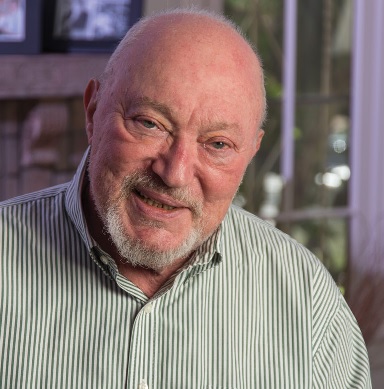 Jerry Greenberg, the Oscar-winning editor (for The French Connection) who collaborated with Brian De Palma on six projects, passed away yesterday at the age of 81. Greenberg worked on five features with De Palma: Dressed To Kill, Scarface, Body Double, Wise Guys, The Untouchables, and the music video for Bruce Springsteen's Dancing In The Dark. In Susan Dworkin's 1984 book Double De Palma, De Palma said of Greenberg, "I can just talk to him on the phone, and he'll know exactly what I want. And can even do it better."
Jerry Greenberg, the Oscar-winning editor (for The French Connection) who collaborated with Brian De Palma on six projects, passed away yesterday at the age of 81. Greenberg worked on five features with De Palma: Dressed To Kill, Scarface, Body Double, Wise Guys, The Untouchables, and the music video for Bruce Springsteen's Dancing In The Dark. In Susan Dworkin's 1984 book Double De Palma, De Palma said of Greenberg, "I can just talk to him on the phone, and he'll know exactly what I want. And can even do it better."Greenberg says his success on his two films with Friedkin was in part a result of the fact that his collaborator was a director “of considerable ability when it came to taking a point of view on how a film is to be presented.” He puts the director with whom he has had his longest and closest association into that same category: Brian De Palma. The pair teamed on five films in the 1980s, including Dressed to Kill (1980) and Scarface (1983).The editor was initially attracted to working with De Palma when the director interviewed him for Dressed to Kill at the behest of De Palma’s longtime editor, Paul Hirsch, ACE, a friend of Greenberg’s, when Hirsch’s schedule precluded him from taking the gig. The reason he wanted to do the film, Greenberg says, was the fact that De Palma had crudely storyboarded the entire movie himself, including minute details.
“He had me down to his office, which was a residential apartment in Manhattan,” Greenberg recalls. “He took me into a small dining room that was, because of the size, completely mirrored to make it appear larger, I guess. On the dining room wall, all around, he had taped three-by-five-inch file cards, storyboarding the whole film. All the drawings were his — simple stick figures most of the time, where he would try to indicate camera movement with little arrows and stuff like that.
“That might seem threatening to another editor,” he continues. “But to me, I thought, ‘Here was a director who knew how his film should be edited.’ I liked that the director knew a little bit about editing, and I felt encouraged. I loved editing that movie. It wasn’t necessarily just the performances or the hooks, the usual things that get you into it. I was doing it completely for the camera work — the way he used the camera, and that was very exciting.”
Still, Greenberg insists the fact that he worked with De Palma five times — more than he worked with any other single director — “was just a coincidence.” Indeed, he emphasizes that he is an editor who never pursued a single collaborative partner on which to hang his hat.
“I don’t think of myself that way in a working sense,” he offers. “I don’t think I generate a lot of confidence in directors in that way. Consequently, although maybe Brian De Palma is an exception, I don’t think I inspire that kind of ‘I’ll just continue working with him’ thing with directors. But then, I never wanted to do that anyway.”
Indeed, Greenberg says he doesn’t view “collaboration” as being just about his relationship with the director. Nor does he express common concerns among editors about being asked to re-cut his work, or even having others re-cut his work. He’s experienced it all over the years — from having wide latitude to having almost no latitude at all. And it’s all fine with him, he says, because, in his view, the nature of a collaborative art like filmmaking involves a work being in a sense passed around and “embellished” by different people repeatedly, a process he says he loves.
“Usually, the task goes from one to the other, so that at every step in passing it, it is embellished and then witnessed by other people, whatever the embellishment was,” he explains. “That is the kind of collaboration filmmaking is. It isn’t a sure thing, but it is a wonderful thing. Being able to pass a responsibility, and different ways of seeing things, from one person to the other, even if it goes on and on — I think that’s terrific. Because, if you have an open mind, what you can do is change what you had done originally, and make it something you could never have thought of on your own. That’s why I’m never threatened by anybody who wants to re-edit my work. I feel like maybe their ideas will spark more ideas in me.”
 Jerry Greenberg, the Oscar-winning editor (for The French Connection) who collaborated with Brian De Palma on six projects, passed away yesterday at the age of 81. Greenberg worked on five features with De Palma: Dressed To Kill, Scarface, Body Double, Wise Guys, The Untouchables, and the music video for Bruce Springsteen's Dancing In The Dark. In Susan Dworkin's 1984 book Double De Palma, De Palma said of Greenberg, "I can just talk to him on the phone, and he'll know exactly what I want. And can even do it better."
Jerry Greenberg, the Oscar-winning editor (for The French Connection) who collaborated with Brian De Palma on six projects, passed away yesterday at the age of 81. Greenberg worked on five features with De Palma: Dressed To Kill, Scarface, Body Double, Wise Guys, The Untouchables, and the music video for Bruce Springsteen's Dancing In The Dark. In Susan Dworkin's 1984 book Double De Palma, De Palma said of Greenberg, "I can just talk to him on the phone, and he'll know exactly what I want. And can even do it better."Greenberg says his success on his two films with Friedkin was in part a result of the fact that his collaborator was a director “of considerable ability when it came to taking a point of view on how a film is to be presented.” He puts the director with whom he has had his longest and closest association into that same category: Brian De Palma. The pair teamed on five films in the 1980s, including Dressed to Kill (1980) and Scarface (1983).The editor was initially attracted to working with De Palma when the director interviewed him for Dressed to Kill at the behest of De Palma’s longtime editor, Paul Hirsch, ACE, a friend of Greenberg’s, when Hirsch’s schedule precluded him from taking the gig. The reason he wanted to do the film, Greenberg says, was the fact that De Palma had crudely storyboarded the entire movie himself, including minute details.
“He had me down to his office, which was a residential apartment in Manhattan,” Greenberg recalls. “He took me into a small dining room that was, because of the size, completely mirrored to make it appear larger, I guess. On the dining room wall, all around, he had taped three-by-five-inch file cards, storyboarding the whole film. All the drawings were his — simple stick figures most of the time, where he would try to indicate camera movement with little arrows and stuff like that.
“That might seem threatening to another editor,” he continues. “But to me, I thought, ‘Here was a director who knew how his film should be edited.’ I liked that the director knew a little bit about editing, and I felt encouraged. I loved editing that movie. It wasn’t necessarily just the performances or the hooks, the usual things that get you into it. I was doing it completely for the camera work — the way he used the camera, and that was very exciting.”
Still, Greenberg insists the fact that he worked with De Palma five times — more than he worked with any other single director — “was just a coincidence.” Indeed, he emphasizes that he is an editor who never pursued a single collaborative partner on which to hang his hat.
“I don’t think of myself that way in a working sense,” he offers. “I don’t think I generate a lot of confidence in directors in that way. Consequently, although maybe Brian De Palma is an exception, I don’t think I inspire that kind of ‘I’ll just continue working with him’ thing with directors. But then, I never wanted to do that anyway.”
Indeed, Greenberg says he doesn’t view “collaboration” as being just about his relationship with the director. Nor does he express common concerns among editors about being asked to re-cut his work, or even having others re-cut his work. He’s experienced it all over the years — from having wide latitude to having almost no latitude at all. And it’s all fine with him, he says, because, in his view, the nature of a collaborative art like filmmaking involves a work being in a sense passed around and “embellished” by different people repeatedly, a process he says he loves.
“Usually, the task goes from one to the other, so that at every step in passing it, it is embellished and then witnessed by other people, whatever the embellishment was,” he explains. “That is the kind of collaboration filmmaking is. It isn’t a sure thing, but it is a wonderful thing. Being able to pass a responsibility, and different ways of seeing things, from one person to the other, even if it goes on and on — I think that’s terrific. Because, if you have an open mind, what you can do is change what you had done originally, and make it something you could never have thought of on your own. That’s why I’m never threatened by anybody who wants to re-edit my work. I feel like maybe their ideas will spark more ideas in me.”
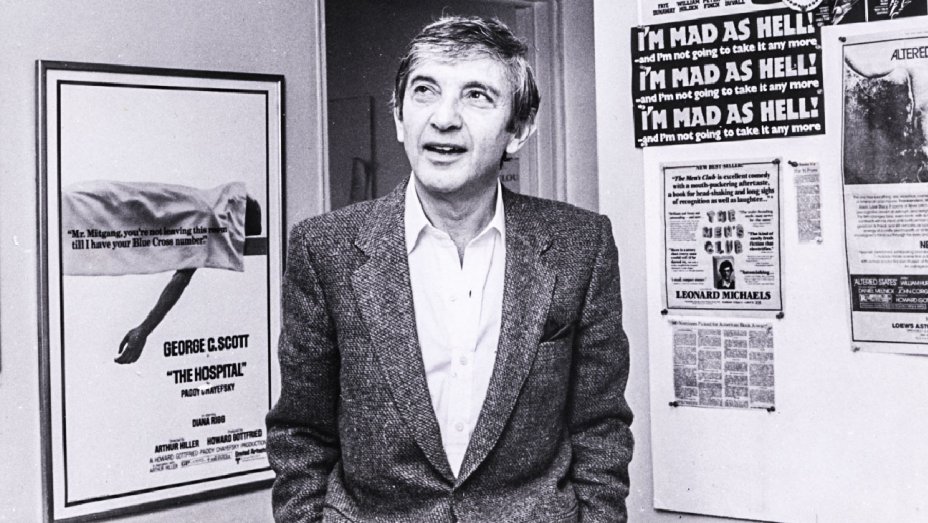
She had come to Brian's attention during the winter before Body Double started shooting, when Howard Gottfried, the executive producer, went to the Consumer Electronics Show in Las Vegas. The X-rated home video marketers had been denied space on the convention floor, but their wares and their stars were available in hotel rooms close by.Howard threw up his hands. "Can you imagine, I went to Las Vegas with my casting lady to look at porno movies?! Can you imagine, I go in, I say..."--he straightens his jacket which he always wears with jeans and cocks his head like David Niven--"... Uh hello, I am from Columbia Pictures and I would like to talk with you about a major motion picture.... I mean, they look at you like you're some kind of lunatic!"
It is true that Howard Gottfried is not the sort of man you would ordinarily imagine as a sex scout. A voluble New Yorker with a burning concern about social issues, he made his name in the film industry as the partner of Paddy Chayefsky in such literate and relevant films as Hospital and Network and Altered States. Culturally and intellectually, Howard was made a little crazy by the porn connections of Body Double, all the more so because unlike Brian, unlike Steve Burum, the director of photography, and Joe Napolitano, the first assistant director, Howard Gottfried had children. Howard was the one who had to go home to his family in New York and be assaulted by feminist friends at dinner parties who wanted to know if it was true, was Howard really making a pornographic movie?! ... It was lucky for Howard, therefore, that he had a sense of humor. And Brian De Palma's sense of humor meant as much to him as any other element in the movie.
"Why do they say Brian hates women more than other filmmakers?" Howard asked. "Saturday Night Fever treated women like pieces of meat. And look at Flashdance. Sure she had a job, she had ambition, she was liberated. But how does she show us she's liberated? When the ex-wife stops at the table and asks, 'What do you two do?' she answers 'We fuck our brains out.' It's insulting to women because it means to be a serious portrayal. Now, look at this scene in Body Double with Linda Shaw. Is this a serious portrayal? They're both on these water beds and she's massaging her breasts in this television interview and she's screaming, 'I'm coming! I'm coming!' and the interviewer says, 'So while she's coming, we'll break fr this clip.' Now that's funny. That's fun-nee! How can all these women despise a guy who's as funny as that?!"
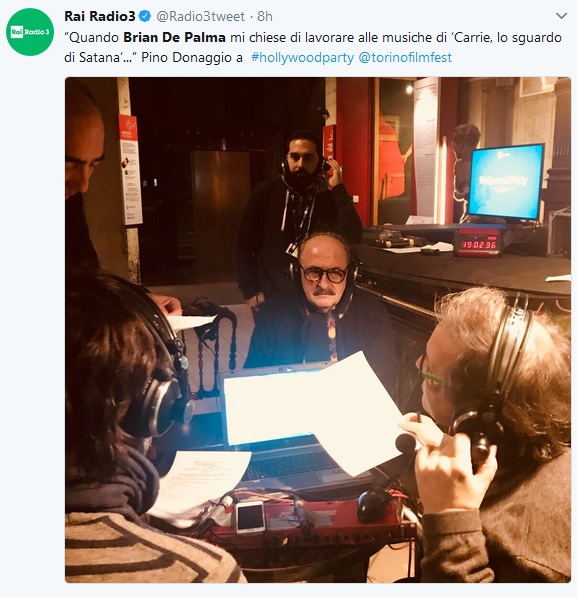
The thirty-fifth Torino Film Festival invites Pino Donaggio as the representative of the retrospective dedicated to Brian De Palma. An author for whom Maestro Donaggio wrote the music for six of his films. We all know the titles - Carrie, Dressed to Kill, Blow Out, Body Double, Raising Cain, and (the less famous) Passion - but listening to the composer's stories instantly provokes goosebumps: "Do you remember Carrie's ending? When Amy Irving walks past the grave and we see her hand jump off the ground accompanied by the music? I saw George Lucas jump during that scene, he jumped from the cinema chair. And he started laughing as if he wanted to say: 'You cheated me!'".Another anecdote about Carrie is about Martin Scorsese: "We were in New York and in a cinema showing Carrie ... with the title in the luminous sign in big letters, and at the bottom, but much smaller, there was the title of the second film: Taxi Driver. Brian took the picture of that sign and sent it to Scorsese! I have wonderful memories of that period: Brian was very close to Spielberg, Scorsese and Coppola."
Maestro Donaggio still works with De Palma today. He is currently busy creating the music for his new thriller: Domino. What will we see on the screen?
The plot is simple: the films of Brian are, at least the ones that I do with him which are those full of suspense, action and sex. Domino opens with a death: they kill the companion of a policeman and then this protagonist goes around all over Europe to look for the perpetrators. Among other things, he also meets ISIS members and other terrorists while he continues to hunt for the guilty. There will be a great finale set during a Bullfight with people running up the stairs.You named De Palma's friends: Scorsese, Spielberg and Coppola, that is, authors who almost always work with the same troupe. Are there any De Palma films that you did not participate in - I think about Scarface or The Untouchables - were you too busy at the time?
No. I wanted to do them all. But he had made up his mind that I was good at making that kind of music for that kind of suspense film. He said that he had worked with many but that he found me "the best of all on those films in particular". He thought I was not suitable for more dramatic films like The Untouchables, or Casualties Of War. The strange thing is that when this happens, he avoids me. He does not want me to do even the audition, because he feels uncomfortable telling me no. I remember in the eighties I was in New York: I was working on the music of The Fan ... he was in the same building I was in. I wanted to say hello. He told me he was busy. The truth is that he was starting another movie. And he could not tell me that I would not have done that movie. He is a bit like that. But when he comes to Venice we always see each other. (Smiles)You have worked a lot also for Italian cinema. Is there a film you would have liked to participate in, which you did not do?
We should have done with Benigni and Troisi the following: Nothing Left To Do But Cry. It was scheduled but then it was different after the death of Troisi. It was a lot of fun to work on that first film: Benigni and Troisi came to me to ask me the theme. They left me free: "You and we listen to him" - they told me. And then in that movie we played with the music. There were musical gags like in the scene in which they open the door hoping to find themselves in the present and instead find the musicians of the Middle Ages.Returning to the cinema of De Palma. One of the greatest fans of the director is Quentin Tarantino. Have you ever discussed with him about a potential project to be developed together?
Tarantino used the Blow Out theme in his Death Proof. Once I read an interview in which he said: "I love the music of Donaggio" ... yet he never called me (smiles). Another who loves my work is Benicio del Toro. He said: "When I prepare a film I listen to Donaggio's music" ... he too has never called me though. Maybe he does not have my number yet!
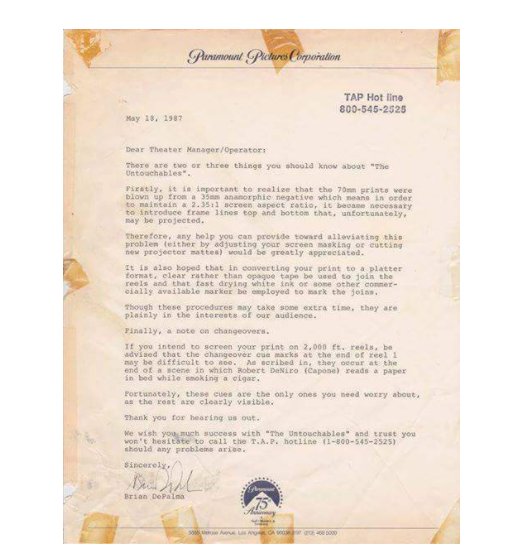
Firstly, it is important to realize that the 70mm prints were blown up from a 35mm anamorphic negative which means in order to maintain a 2.35:1 screen aspect ratio, it became necessary to introduce frame lines top and bottom that, unfortunately, may be projected.Therefore, any help you can provide toward alleviating this problem (either by adjusting your screen masking or cutting new projector mattes) would be greatly appreciated.
It is also hoped that in converting your print to a platter format, clear rather than opaque tape be used to join the reels and that fast drying white ink or some other commercially available marker be employed to mark the joins.
Though these procedures may take some extra time, they are plainly in the interests of our audience.
Finally, a note on changeovers.
If you intend to screen your print on 2,000 ft. reels, be advised that the changeover cue marks at the end of reel 1 may be difficult to see. As scribed in, they occur at the end of a scene in which Robert DeNiro (Capone) reads a paper in bed while smoking a cigar.
Fortunately, these cues are the only ones you need to worry about, as the rest are clearly visible.
Thank you for hearing us out.
We wish you much succcess with The Untouchables and trust you won't hesitate to call the T.A.P. hotline (1-800-545-2525) should any problems arise.
Sincerely, Brian DePalma
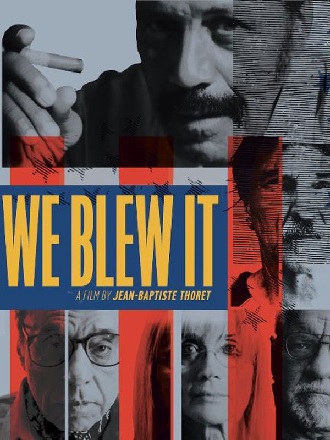 Filmed during the year leading up to the election of Donald Trump as president, Jean-Baptiste Thoret's documentary We Blew It takes its title from a line spoken by Peter Fonda in Dennis Hopper's Easy Rider. As The Hollywood Reporter's Bernard Besserglik describes it, "Jean-Baptiste Thoret's enthralling documentary We Blew It tackles the riddle of the 1960s head-on — a riddle that has been the subject of lively debate virtually since the day the decade ended. How, after that heady upsurge of youthful idealism and revolt, did we get to where we are now? What happened to the dreams and visions of the peace-and-love generation? What were the twists and turns that brought us from Easy Rider to Donald Trump?"
Filmed during the year leading up to the election of Donald Trump as president, Jean-Baptiste Thoret's documentary We Blew It takes its title from a line spoken by Peter Fonda in Dennis Hopper's Easy Rider. As The Hollywood Reporter's Bernard Besserglik describes it, "Jean-Baptiste Thoret's enthralling documentary We Blew It tackles the riddle of the 1960s head-on — a riddle that has been the subject of lively debate virtually since the day the decade ended. How, after that heady upsurge of youthful idealism and revolt, did we get to where we are now? What happened to the dreams and visions of the peace-and-love generation? What were the twists and turns that brought us from Easy Rider to Donald Trump?"Basically, We Blew It is a film that deals with the question of the years '60-'70 by questioning their very existence. The work of a director who evolves in a landscape of images and is all too aware of the impact of these images themselves not to wonder if they have not printed in the retina of the popular unconscious a reality that never took place. A dialectic that is found in particular in the staging bias of Thoret. Filmmaker obviously cinephile, the author multiplies the references to New-Hollywood to question his own references. We think of the scene where the camera is walking in Dallas, on the road on which JFK died as if it were scanning the traces of a perennial trauma. As the screen sweeps the asphalt, an oppressive music straight out of a film by Brian De Palma, THE filmmaker who made this fatal day of November 15, 1963 the reason for his cinema, accentuates and invades the entire sound space. As if Thoret summoned the spectrum of the director of Blow Out to derealize what he films and plunge into an agonizing abstraction, which exceeds the factual historical event to touch something more disturbing. For those who arrive in the empty room of all references, the tools work in the first degree, but for the viewer initiated to its author and his cinephilia, Thoret brings a historical event to his cinematographic representation, as if the passage of a historical event in a regime of specific images had altered the initial reality. Did New Hollywood invent these years? Has cinema created America? This is the agonizing question that runs through the author's approach, seeking the traces of cinema in what he films.